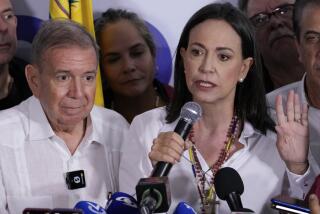Anti-Ortega campaign heats up in homestretch
- Share via
MEXICO CITY — With leftist Daniel Ortega holding a big lead in the final polls ahead of Sunday’s election, his conservative opponents and their U.S. allies were warning Nicaraguans that their country may face dire economic consequences if Ortega becomes its next president.
U.S. Commerce Secretary Carlos M. Gutierrez and Paul Trivelli, the U.S. ambassador in Managua, have also both said that an Ortega victory could prompt cuts in aid from the United States, leading the Sandinistas and others here to denounce outside interference in the Nicaraguan electoral process.
“It’s a little unfortunate to see this foreign intervention in a small, friendly country like ours,” said Jaime Morales Carazo, a political leader in the right-wing Contra movement that sought to topple Ortega’s revolutionary government during the 1980s. Morales has mended fences with the Sandinistas and is Ortega’s vice presidential running mate.
Ortega must win at least 35% of the vote and outpoll his nearest competitor by 5 percentage points to secure an outright victory and avoid a December runoff. That would return him to power 16 years after Nicaraguans voted him out of office in the wake of a protracted war with the U.S.-backed Contras.
Polls show Ortega with a double-digit lead over his nearest challenger in the five-candidate field, and tantalizingly close to reaching the 35% mark.
If Ortega fails to win a first-round victory, analysts say, he would face an uphill battle in the runoff because the anti-Sandinista vote would be united behind a single candidate. Conservative candidates have defeated Ortega in the last three presidential elections.
On Tuesday, U.S. Rep. Dana Rohrabacher (R-Huntington Beach) joined two other GOP congressmen in asking Homeland Security Secretary Michael Chertoff to prepare to block people in the U.S. from sending money to Nicaragua should Ortega be elected.
“If Daniel Ortega, who has declared himself as an enemy of the United States, takes back control of Nicaragua, you can expect the U.S. government to respond accordingly,” Rohrabacher wrote. “We will not permit a hostile, anti-American government to reap the same economic benefits” as U.S. allies, the congressman said.
One in five Nicaraguan families depends on money from relatives living abroad for a substantial chunk of income.
Conservative candidate Eduardo Montealegre, who is running second to Ortega in most polls, began a telephone campaign this week warning voters that Nicaraguans may lose their ability to receive remittances from relatives in the U.S. should the candidate of the Sandinista National Liberation Front win the election.
In nearby El Salvador in 2004, right-wing candidate Tony Saca used a similar campaign and defeated a leftist candidate in that country’s presidential election.
But Nicaraguan political analyst Sergio Santamaria doesn’t believe the telephone campaign will help Montealegre much.
“He started the campaign too late,” Santamaria said. “Montealegre may only succeed in narrowing the gap to less than 10 percentage points, but the final result won’t change.”
This year, U.S. officials tried unsuccessfully to broker an alliance between Ortega’s two leading conservative opponents, Montealegre and Jose Rizo of the Liberal Party, according to news reports and political consultants.
Now, in the waning days of presidential campaigning, many in the cast of characters from the days of the Contra war with the Sandinistas have passed through Managua to stump for Montealegre and Rizo.
Former U.N. Ambassador Jeane J. Kirkpatrick recently co-hosted a Montealegre fundraiser. And Oliver North, the retired Marine officer at the heart of the Iran-Contra scandal in the 1980s, came to Managua to campaign for Rizo.
Morales, the Sandinista vice presidential candidate, was unimpressed.
“These are the last-gasp efforts of a few people who think the world still works the way it did 20 years ago,” he said in a telephone interview. “They want to start a mini-Cold War here in Nicaragua.”
Ortega is refashioning the Sandinista Front into a “big tent” party, and has won the support of former Contra leaders who have grown frustrated with their right-wing political allies.
On Wednesday, Ortega signed a “governability pact” drafted by the Nicaraguan Chamber of Commerce in which he promised to respect free markets and property rights if elected.
Times special correspondent Alex Renderos in San Salvador contributed to this report.
More to Read
Sign up for Essential California
The most important California stories and recommendations in your inbox every morning.
You may occasionally receive promotional content from the Los Angeles Times.














